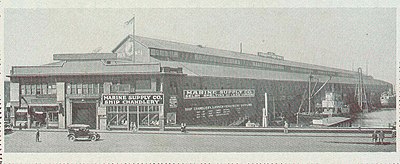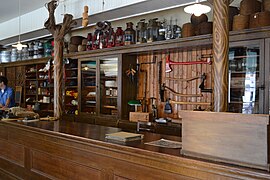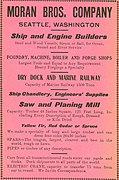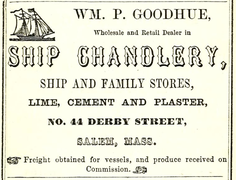



A ship chandler is a retail dealer who specializes in providing supplies or equipment for ships.
Synopsis
For traditional sailing ships, items that could be found in a chandlery include sail-cloth, rosin, turpentine, tar, pitch, linseed oil, whale oil, tallow, lard, varnish, twine, rope and cordage, hemp, and oakum. Tools (hatchet, axe, hammer, chisel, planes, lantern, nails, spike, boat hook, caulking iron, hand pump, and marlinspike) and items needed for cleaning such as brooms and mops might be available. Galley supplies, leather goods, and paper might also appear. In the Age of Sail, ship chandlers could be found on remote islands, such as St. Helena, who were responsible for delivering water and fresh produce to stave off scurvy.
Today's chandlers deal more in goods typical for fuel-powered commercial ships (oil tanker, container ship, and bulk carrier) including maintenance supplies, cleaning compounds, and food stores for the crew.
A distinguishing feature of a ship chandler is the high level of service demanded and the short time required to fill and deliver orders. Commercial ships discharge and turn around quickly; delay is expensive, making the services of a dependable ship chandler in great demand. Advantages, today and in the past, are that stores in unfamiliar ports do not need to be sought out, and lines of credit make exchanging of currency a non-issue. (Usually a ship owner would establish a line of credit with the chandler and then be billed for anything delivered to the crew.) Chandlers also deliver the product, freeing up crew to work on repairs or, if allowed, take shore leave.
The ship chandlery business was central to the existence and the social and political dynamics of ports and their waterfront areas. Ship chandlers are typically supplied by nearby merchants.
Gallery
-
 Restored ship chandlery, c. 1900, at the Maritime Museum of the Atlantic in Halifax, Nova Scotia
Restored ship chandlery, c. 1900, at the Maritime Museum of the Atlantic in Halifax, Nova Scotia
-
 A 1900 advertisement from the Moran Brothers included ship's chandlery items as part of a marine refit business.
A 1900 advertisement from the Moran Brothers included ship's chandlery items as part of a marine refit business.
-
 Wm. P. Goodhue advertised in 1857 his Derby St Salem, MA ship's chandlery business.
Wm. P. Goodhue advertised in 1857 his Derby St Salem, MA ship's chandlery business.
-
 The Bosun's Locker business advertises their ship's chandlery right on the waterfront of port in Falmouth, Cornwall.
The Bosun's Locker business advertises their ship's chandlery right on the waterfront of port in Falmouth, Cornwall.
-
 Limekiln Chandlery of Lichfield Street occupies what was once a railway station at Stourport-on-Severn.
Limekiln Chandlery of Lichfield Street occupies what was once a railway station at Stourport-on-Severn.
-
 Solent Marine Chandlery in Mumby Road is a fixture on the Gosport side of Portsmouth Harbour.
Solent Marine Chandlery in Mumby Road is a fixture on the Gosport side of Portsmouth Harbour.
-
 Seventeenth-century ship's chandler, Amsterdam
Seventeenth-century ship's chandler, Amsterdam
-
 1932 chandler's lighter, now a museum piece
1932 chandler's lighter, now a museum piece
References
- The Maritime Industry Knowledge Centre
- Engel, Matthew (January 29, 2016). "Last boat to St Helena". www.next.ft.com.
- Stinchcombe, Arthur L. (1995). Sugar Island Slavery in the Age of Enlightenment: The Political Economy of the Caribbean World. Princeton, New Jersey: Princeton University Press. pp. 311–318. ISBN 0-691-02995-4.